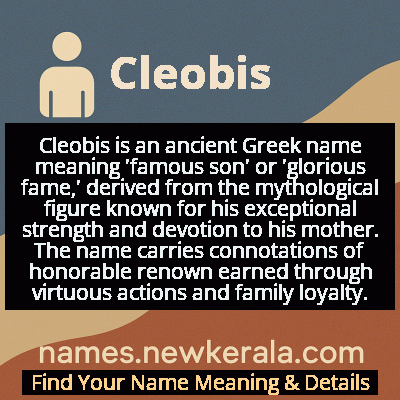Cleobis Name Meaning & Details
Origin, Popularity, Numerology Analysis & Name Meaning of Cleobis
Discover the origin, meaning, and cultural significance of the name CLEOBIS. Delve into its historical roots and explore the lasting impact it has had on communities and traditions.
Name
Cleobis
Gender
Male
Origin
Greek
Lucky Number
2
Meaning of the Name - Cleobis
Cleobis is an ancient Greek name meaning 'famous son' or 'glorious fame,' derived from the mythological figure known for his exceptional strength and devotion to his mother. The name carries connotations of honorable renown earned through virtuous actions and family loyalty.
Cleobis - Complete Numerology Analysis
Your Numerology Number
Based on Pythagorean Numerology System
Ruling Planet
Moon
Positive Nature
Diplomatic, friendly, artistic, empathetic.
Negative Traits
Over-sensitive, moody, indecisive, prone to self-pity.
Lucky Colours
Green, cream, white.
Lucky Days
Monday.
Lucky Stones
Pearl, moonstone.
Harmony Numbers
1, 3, 4.
Best Suited Professions
Diplomats, mediators, caregivers, artists.
What People Like About You
Cooperative spirit, friendliness, artistic talent.
Famous People Named Cleobis
Cleobis of Argos
Mythological Figure
Exemplar of filial piety who with his brother Biton pulled their mother's cart to Hera's temple
Cleobis (Historical)
Ancient Greek Athlete
Victorious athlete recorded in ancient Greek inscriptions from the 6th century BCE
Cleobis the Sculptor
Artist
Attributed creator of early Greek kouros statues, though historical attribution remains uncertain
Name Variations & International Equivalents
Click on blue names to explore their detailed meanings. Gray names with will be available soon.
Cultural & Historical Significance
Extended Personality Analysis
The name Cleobis evokes personality traits centered around strength in service, quiet dignity, and profound loyalty. Individuals bearing this name are often perceived as having an inner fortitude that manifests not in aggression or dominance, but in reliable support and protective care for others. They typically exhibit a calm, grounded nature with deep emotional intelligence, understanding when to act and when to remain steadfast. Their strength is both physical and moral—they possess the courage to undertake difficult tasks for loved ones while maintaining humility about their contributions. These individuals often serve as the moral compass in their social circles, valued for their unwavering principles and ability to bear burdens without complaint. While they may not seek leadership positions, they naturally command respect through their consistent actions and quiet competence. Their personality combines the heroic with the humble, creating a character type that is both admirable and approachable, embodying the ideal that true greatness serves rather than dominates.
Modern Usage & Popularity
In contemporary naming practices, Cleobis remains an extraordinarily rare choice, primarily confined to academic families, Greek cultural traditionalists, and those with specific interest in classical mythology. The name has virtually no presence in global naming databases and maintains an archaic, almost scholarly character that limits its mainstream appeal. Its usage is predominantly in Greece itself, where ancient names occasionally experience revivals, though Cleobis has not benefited from the same resurgence as names like Aristotle or Alexander. The strong association with a specific mythological narrative and the name's formal, classical sound make it challenging for modern adaptation. However, among classical scholars and Hellenic cultural enthusiasts, the name retains respect as carrying deep historical and ethical significance, representing ideals of family devotion and virtuous strength that transcend its ancient origins.
Symbolic & Spiritual Meanings
Symbolically, Cleobis represents the convergence of physical strength and moral virtue, embodying the ideal that true power exists to serve higher purposes. The name carries deep metaphorical significance as a symbol of filial devotion transformed into divine favor, suggesting that the most meaningful human actions are those performed out of love and duty rather than ambition. It represents the paradox of strength in humility—the powerful individual who chooses service over dominance. The mythological narrative imbues the name with themes of blessed sacrifice and eternal remembrance, making it symbolic of legacy earned through selfless action. Cleobis serves as a metaphorical reminder that the greatest rewards often come not from seeking personal glory but from faithfully fulfilling one's responsibilities to family and community. The story's conclusion—where peaceful death becomes the ultimate divine gift—adds layers of meaning about the nature of fulfillment and how true contentment comes from living virtuously rather than living long.

